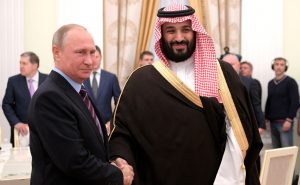By Kunwar Khuldune Shahid
At least eight people were injured when Houthi rebels launched a drone attack on Saudi Arabia’s Abha airport on August 31. The strike came two days after one of the most lethal Houthi attacks in recent times, as 30 soldiers of the Saudi-led coalition were killed and over 60 injured in drone and missile attacks in Yemen’s southern al-Anad military base.
The Houthi attacks were a message to the Arab, Iranian and other leaders that had come together for the Baghdad summit last week. For, among the many subplots surrounding the conference in Iraq, also attended by the Middle East-eying Emmanuel Macron, was the next step towards reconciliation between Saudi Arabia and Iran, both of whom were represented by their foreign ministers.
Yemen — which exploded with Iran-backed Houthis striking a reminder of their militant ambitions of dislodging the Saudi-supported Abdrabbuh Mansur Hadi government — is the most prominent among the many theatres where Riyadh and Tehran have played out their rivalry. Another is the Shia-majority Iraq, whose sizeable Sunni population had been ruling the country for centuries till the US intervention, which now sees itself best placed to act as a mediator in the region. However, much of the focus of the summit was on developments elsewhere.
Macron — evidently lured by Iraq’s position in the regional dynamics and the country’s parallels with Afghanistan as the next volatile country the US will withdraw from — echoed alarm bells over Taliban’s takeover in Kabul. The jihadist group’s swift rise to power will also dominate any discussions between Iran and Saudi Arabia, which met informally in April over five years since Riyadh cut ties following an attack on its embassy in Tehran. The two countries’ ministers unofficially spoke in Baghdad with Iran’s Hossein Amirabdollahian confirming that Saudi was ready to resume formal communications once the new government is set up in Tehran.
As the Taliban convince the world that they have changed, for Riyadh and Tehran what is more critical is the fact that the region bears little resemblance to the last time the Taliban were in power, when Saudi Arabia and the UAE rushed to recognise the Taliban government and Iran nearly went to war with Afghanistan over the killing of its diplomats. The US, that was omnipresent in the region to consolidate the dissolution of the Soviet Union, is now earmarking Iraq as the final domino that Washington puts back in its place.
It is no coincidence that reconciliatory whispers, led by Mohammed bin Salman, began surfacing in Saudi after Joe Biden’s announcement of withdrawal from Afghanistan this year. Lack of US interest in the Middle East would reduce the investments of its military industrial complex, which makes jihadist proxy wars less lucrative for Saudi Arabia. More critically, without the global superpower as a regional proctor, the countries would have to shun their erstwhile lucrative fault-lines and figure out a way to tolerate each other’s existence.
MBS’s much touted bid to ‘modernise’ Saudi Arabia by adopting ‘moderate Islam’ has been as much in anticipation of a US pullback, as it has been a quest to economically revamp the kingdom which is losing its crude hegemony. For Iran, already faced with crippling sanctions and the fiscal pulverisation of realms it seeks to influence — Yemen, Iraq, Syria and Lebanon — the benefits of not having to wage proxy jihad to exert itself are obvious. Tehran’s economic desperation is even pushing it to welcome the Sunni jihadist regime in bordering Afghanistan, because anti-US Taliban might give Iran access to water flowing from Helmand River to Sistan-Baluchistan.
Where Iran has had no issues backing Sunni jihadists overlapping with its interests — as exemplified by Hamas in Gaza — the Iranian leadership also sees the Taliban, especially those in power, as manifesting a less gory brand of anti-Shi’ism as compared to the rival Islamic State, even if the former and its affiliates have massacred Shia communities on both sides of the Af-Pak border.
Despite also adhering to Sunni Islam, the Taliban belong to the Deobandi sub-sect, which differs to the Salafi branch espoused by Saudi — and indeed Isis and al-Qaeda. With the historically pluralistic Sufi Barelvi sub-sect also propping up jihadist groups in South Asia, modern Sunni Islamist militancy is no longer the monolith that Saudi helped formulate at the end of the 20th century.
Indeed, Saudi Arabia is no longer the undisputed of the Sunni world either. Turkey has clashed with Arab states as Recep Tayyip Erdogan seeks to reinstate ‘Ottoman’ hegemony over the Muslim world. Malaysia’s 2019 Muslim summit backed by Erdogan was duly snubbed by Saudi Arabia precisely over Riyadh’s concerns that its leadership is being challenged.
Even within the Arab bloc, fault-lines have exploded as demonstrated by Gulf leaders in 2017 severing ties with Qatar, which has long aspired to rival Saudi within the GCC and the Muslim world. Qatar which hosted US-Taliban talks, and hence has leverage over the jihadist group’s leadership, is now a key broker in Afghanistan.
The UAE too has been seeking a leadership role in South Asia, as it works on brokering peace between India and Pakistan over Kashmir. Amid MBS’s reforms, an economic clash is brewing with the UAE, as Saudi Arabia seeks to capture the Emirates’ tourist industry and workforce. In July, the two kingdoms came at loggerheads over the interest that unified the GCC four decades ago: oil production.
From the UAE-led formalisation of ties with Israel, to Arab states restoring ties with Qatar, geostrategic moves were made quickly after Donald Trump’s deal with Taliban was signed in Doha last year. Now as the Taliban’s triumph encourages the next wave of global jihad, motivating radical Islamist to plot regional control and legitimacy instead of aspiring for a global caliphate, Saudi and Iran will have to adjust accordingly. For there’s yet another Islamist stakeholder in a Muslim world that is no longer bipolar, nor the focus of the West’s resourceful attention.
 Kunwar Khuldune Shahid is a Pakistan-based journalist and a correspondent for Asia Times and The Diplomat. You can follow him on Twitter
Kunwar Khuldune Shahid is a Pakistan-based journalist and a correspondent for Asia Times and The Diplomat. You can follow him on Twitter

